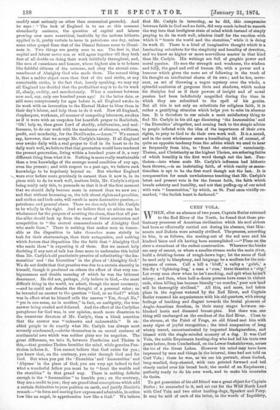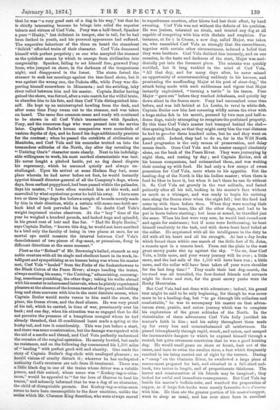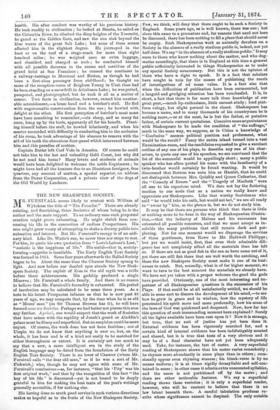CERF VOILA.
WHEN, after an absence of two years, Captain Butler returned to the Red River of the North, he found that those pre- liminary processes of American civilisation which his soul abhors had been so effectually carried out during his absence, that Min- nesota and Dakota were actually civilised. The process, according to him, is as follows, the rooting-out of the red man and his kindred bison and elk having been accomplished :—" Place on the river a steamboat of the rudest construction. Wherever the banks are easy of ascent, or where a smaller stream seeks the main river, build a drinking-house of rough-hewn logs ; let the name of God be used only in blasphemy, and language be a medium for the con- veyance of curses. Call a hill a 'bluff,' a valley a 'gulch,' a flre-fly a lightning-bug,' a man a' cuss,' threelhanties a' city.' Let every man chew when he isn't smoking, and spit when he isn't asleep ; and then, when half-a-dozen persons have come to violent ends, when killing has become literally ' no murder,' your new land will be thoroughly civilised." All this, and more, had taken place in the regions watered by the Red River, and Captain Butler renewed his acquaintance with his old quarters, with strong feelings of loathing and disgust towards the brutal pioneers of Anglo-American freedom, in their many stages between un- blacked boots and diamond breast-pins. But there was one thing still unchanged on the confines of the Red River. Close to the stream, at the Point of Frogs, an old friend met him with many signs of joyful recognition ; the tried companion of long wintry travel, uncontaminated by imported blackguardism, and blessed with the single-minded memory of a dog. It was Cerf Vola, the noble Esquimaux hauling-dog who bad led his train two years before, from Cumberland, on the Lower Saskatchewan, across the ice of the Great Lakes. However his mind may have been impressed by men and things in the interval, time had not told on Cerf Vole ; there he was, as we see his portrait, clean-limbed, long-woolled, deep-chested, with ears pointed forward and tail closely curled over his broad back, the model of an Esquimaux ; perfectly ready to do his own work, and to make his comrades do theirs.
To get possession of his old friend was a great object for Captain Butler ; he succeeded in it, and set out for the Wild North Land with Cerf Vola and two other hauling-dogs, Spanker and Pony. It may be said of each of the latter, in the words of Ingoldaby, that be was "a very good sort of a dog in his way," but that he is chiefly interesting because he brings into relief the superior talents and virtues of Cerf Vela. Pony was a half-breed, Spanker a pare "Husky," but deficient in temper, also in tail, for he had I been docked in youth, and his personal appearance had suffered. The respective behaviour of the three on board the steamboat Selkirk' afforded traits of their character. Cerf Vola demeaned himself with perfect propriety ; as one who accepted the steamer as the quickest means by which to emerge from civilisation into congeniality. Spanker, failing to set himself free, gnawed Pony loose, who jumped on shore, in the darkness of the tempestuous night, and disappeared in the forest. The storm forced the steamer to seek her moorings against the tree-lined shore, but it was against the wrong one, the Dakota silie, while Pony was dis- porting himself somewhere in Minnesota ; and the swirling, inky river rolled between him and his master. Captain Butler having gained the shore, was forced, after a vain search for the wilful brute, to abandon him to his fate, and then Cerf Vola distinguished him- self. He kept up an uninterrupted howling from the deck, and after some time Pony swam out to the steamer, and was taken on board. The same fine common-sense and ready wit continued to be shown in all Cerf Vola's transactions with Spanker, Pony, and the numerous dogs who were pressed into the service later. Captain Butler's human companions were scoundrels of various depths of dye, and he found his dogs additionally precious for the contrast ; when he passed the outskirts of civilisation at Manitoba, and Cerf Vola and his comrades trotted on into the tremendous solitudes of the North, day after day revealing the " Untiring One's" character more clearly. Next to his indefatig- able willingness to work, his most marked characteristic was tact. He never fought a pitched battle, yet no dog dared dispute his supremacy, which he assumed quietly and always un- challenged. Upon his arrival at some Hudson Bay fort, some place wherein he had never before set foot, he would instantly appoint himself director-general of all the Company's dogs, whose days, from earliest puppyhood, bad been passed within the palisades. Says his master, "I have often watched him at this work, and marvelled by what mysterious power he held his sway. I have seen two or three large dogs flee before a couple of bounds merely made by him in their direction, while a certain will-some-one-hold-me- back kind of look pervaded his face." No doubt Cerf Vola's weight impressed canine observers. At the " lazy " time of the year he weighed a hundred pounds, and looked huge and splendid, in his grand coat of hair and fine fur. " Had Sir Boyle Roche," says Captain Butler, " known this dog, he would not have ascribed to a bird only the faculty of being in two places at once, for no mortal eye could measure the interval between Cerf Vola's demolishment of two pieces of dog-meat, or pemmican, flung in different directions at the same moment."
Fleet as the "Roland" of Mr. Browning's ballad, staunch as any noble creature with all its single and obedient heart in its work, in- telligent and sympathising as no human being was whom his master met, Cerf Vola "hauled" from the Forks of the Saskatchewans to the Black Canon of the Peace River ; always heading the trains, always meriting his name, " the Untiring," admonishing, encourag- ing, sometimes punishing, the other dogs ; taking his walks abroad with his master in unharnessed intervals, when he plainly experienced pleasure at the absence of the human rascals of the party, and holding long and close converse with him in the most desolate scenes, when Captain Butler would recite verses to him amid the snow, the pines, the frozen rivers, and the dead silence. He was very proud of his tail, which he carried, in time of war, prominently over his back ; and one day, when his attention was so engaged that he did not perceive the presence of a bumptious mongrel whom he had already thrashed, that ill-conditioned beast made a spring at the bushy tail, and tore it considerably. This was just before a start, and there was some consternation, but the damage was repaired with the aid of a needle and thread, and Cerf Vola perfectly understood the occasion of the surgical operation. He merely howled, but made no resistance, and on the following day commenced his 1,500 miles of " hauling " with perfect good-will and alacrity. One reads the story of Captain Butler's dog-sleds with unalloyed pleasure ; no horrid visions of cruelty disturb it ; wherever he has undisputed authority God's creatures are safe from ill-treatment. There was a little black dog in one of the trains whose driver was a voluble person, and this animal, whose name was " Kuskey-tag-o-atim- moos," would be appealed to " for the love of Heaven to haul his traces," and solemnly informed that he was a dog of no character, the child of disreputable parents. Bat Kuskey-tag-o-atitn-moos seems to have been unsusceptible to the finer emotions, unlike the mules which Mr. Clarence King describes, who were always moved to superhuman exertion, after blows had lost their effect, by hard swearing. Cerf Vola was not without the defects of his qualities. He was jealous, tolerated no rivals, and treated any dog at all capable of competing with him with disdain and suspicion. For instance, at Ile h la Crosse, a new dog, called Major, was taken on, who resembled Cerf Vola so strongly that the resemblance, together with certain other circumstances, induced a belief that they were brothers. Cerf Vola disliked him intensely, and on one occasion, in the haste and darkness of the start, Major was acci- dentally put into the foremost place. The mistake was quickly rectified, but it long rankled in the mind of Cerf Vola. "All that day, and for many days after, ho never missed an opportunity of countermarchiug suddenly in his harness, and prostrating the unoffending Major at his post of steer-dog," the attack being made with such suddenness and vigour that Major instantly capitulated, "turning a turtle" in his traces. Poor Major " gave out" before they reached Athabasca, and quietly lay down silent in the frozen snow. Pony had succumbed some time before, and was left behind at La Loche, to revel in white-fish. Captain Butler saw him last careering wildly across the river with a huge stolen fish in his mouth, pursued by two men and half-a- dozen doge, vainly attempting to recapture the purloined property. By this time Cerf Vola's master had tramped behind the sled— thus sparing his dogs, so that they might carry him the vast distance he had to go—for three hundred miles, but he and they went on gamely still. Indeed, they had to do so, for in the Wild North. Land progression is the only means of preservation, and delay means death. Once Cerf Vola and his master camped absolutely alone, on the bank of the Peace River. They were journeying by night then, and resting by day ; and Captain Butler, sick of his human companions, had outmarohed them, and was waiting their coming up with food. He had only a few scraps of sweet pemmican for Cerf Vola, mere whets to his appetite. But the hauling-dog of the North is like his Indian master ; when there is food he likes to have it, but when it isn't there he can do without it. So Cerf Vola sat gravely in the vast solitude, and fasted patiently after all his toil, looking in his master's face without so much as a whimper, and was ready to begin his untiring race along the frozen river when the night fell ; but the food had come up with them before then. When they were nearing their destination he was lame, like all the other dogs, and had to be put in boots before starting ; but lame or sound, he travelled just the same. When his feet were very sore, he would look round now and again for assistance ; but if none were forthcoming, he bent himself resolutely to the task, and with down-bent head toiled at the collar. He acquiesced with all his intelligence iu the duty he did with all his heart and all his strength. At last a day broke which found them within one march of the little fort of St. John, a remote spot in a remote land. From out the plain to the west great snowy peaks rise up against the sky. " Go on, dear Cerf Vola, a little more, and your weary journey will be over ; a little more, and the last mile of the 1,500 will have been run ; a little more, and the collar will have been taken off your worn shoulder for the last long time ! " They made their last dog-march, the ice-road was all travelled, the four-footed friends and servants might lie down and rest, for the great snowy peaks were the Rocky Mountains.
But Cerf Vola had not done with adventure ; indeed, his grand tour might be said to be only beginning, for though he was never more to be a hauling-dog, but " to go through life collarless and comfortable," he was to accompany his master on that adven- turous river, prairie, and canon journey which was to complete his exploration of the great solitudes of the North. In the vicissitudes of these adventures Cerf Vola fully justified his master's faith in him ; and his safety throughout them made up for every loss and counterbalanced all misfortunes. He passed triumphantly through rapid, wreck, and canon, and escaped the innumerable dangers to which he exposed himself through a rooted, but quite erroneous conviction that he was a good hunting dog. He would smell game ou shore or forest, dash out of the canoe, and have to swim the swollen river, a feat which frequently resulted in his being carried out of sight by the torrent. During a " camp" on the Ominica River, he swallowed a large piece of moose-meat prepared for bait, and attached to a full-sized cod- hook, two inches in length, and of proportionate thickness. The horror and consternation of his friends may be imagined ; they looked for awful and immediate consequences. But Cerf Vole lay beside his master's buffalo-robe, and watched the preparation of supper, as if large fish-hooks were merely favourite lwrs d'ceuvres with him. He then ate the greater portion of his master's supper, went to sleep as usual, and has ever since been in excellent
health. His after conduct was worthy of his previous history. He took readily to civilisation ; he looked at Shasta, he sailed on the Columbia River, he climbed the dizzy heights of the Yosemite, he gazed at the Golden Gate, and saw the sun sink beyond the blue waves of the great Salt Lake ; but none of these scenes affected him in the slightest degree. He journeyed in the boot or on the roof of a stage-coach for more than eight hundred miles ; he was weighed once as extra baggage, and classified and charged as such ; he conducted himself with all possible decorum in the rooms and corridors of the grand hotel at San Francisco ; he crossed the continent in a railway-carriage to Montreal and Boston, as though he had been a first-class passenger from childhood ; he thought no more of the reception-room of Brigham Young in Utah than had he been standing on a snowdrift in Athabasca Lake ; he was petted, pampered, and photographed, but he took it all as a matter of course. Two facts in civilisation, however, caused him unutter- able astonishment,—a brass band and a butcher's stall. He fled with ungovernable consternation from the one ; he howled with delight at the other. His first perception of butcher's meat must have been something to remember,—six sheep, and as many fat oxen, hung up by the heels, apparently all for his benefit. Plant- ing himself before the stall, he howled hilariously, and when his master succeeded with difficulty in conducting him to the seclusion of his room, he took advantage of his absence to remove with the aid of his teeth the obnoxious door-panel which intervened between him and this paradise of mutton.
Captain Butler left Cerf Vola in America. Of course he could not take him to the hot and unhealthy Gold Coast, but why did he not send him home? Many lovers and students of animals would have been delighted to welcome the noble Esquimaux ; he might have had all the honours due to an illustrious foreigner, free quarters, any amount of mutton, a special reporter, an address from the Dover Corporation, and a private view of the dogs of the Old World by Landseer.




































 Previous page
Previous page